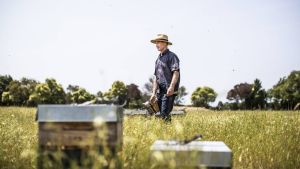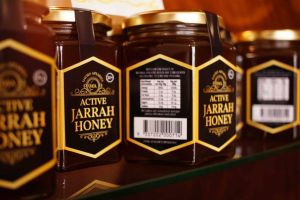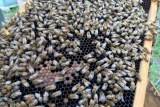
(ABC Rural: Bridget Fitzgerald)
European farmers are facing a total ban on a common group of pesticides after a report confirms they harm bees, putting pressure on Australia to follow.
The report published by the European Food Safety Authority [EFSA] analysed more than 1,500 studies and found three neonicotinoid pesticides posed a high risk to all bees.
In 2013 the European Union put a temporary ban on the chemicals that were commonly used in agriculture to treat seeds.
Research fellow at the University of New England Manu Saunders said the report confirmed what scientists expected.
"The risks are high and there is an issue of chronic exposure to neonicotinoids to not just honey bees but also wild bees and other pollinators," she said.
Despite the body of evidence Dr Saunders said the issue remained a controversial one.
"Any issue like this is always controversial when there are a lot of interests involved, but at the end of the day the scientific evidence shows there is a clear issue here," she said.
Chemical companies question the science
In a statement to the ABC neonicotinoid manufacture Sygenta said the report came as no surprise.
"In 2013, EFSA relied on an unapproved regulatory document to reach its decision on the ban of neonicotinoids. EFSA sadly continues to rely on a document that has been consistently blocked by most EU Member States on the grounds that it is overly conservative, extremely impractical and would lead to a ban of most if not all insecticides, including organic products."
The Australian Pesticides and Veterinary Medicines Authority (APVMA), which regulates the use of neonicotinoids in this country, told the ABC in a statement there was no evidence of bee population declines in Australia.
"All neonicotinoids registered for use in Australia have been through the APVMA’s robust chemical risk assessment process and are safe and effective — provided products are used as per the label instructions. Australia has strong surveillance measures in place to monitor chemicals used nationally".
Researcher Manu Saunders said while domesticated honey bee populations were not in decline in Australia, there could be an impact on wild bees and insects.
"They have very different responses to environmental change to wild insects that are living out in the bush," she said.
"A lot of those wild insects are susceptible to things that happen around them because they don't have that security of being domesticated in a sense where we humans can keep an eye on them.
"I mean there's not a lot of research but they are suffering from issues like overuse of chemicals and habitat clearing."
Beekeepers call for Australian ban
David Severino, a commercial bee keeper from Phillip Island, said he wanted a ban on neonicotinoids in Australia.
"Australia does have healthy bees here because we don't have other diseases that we have worldwide, however we do know the chemicals are having adverse reactions on our bees," he said.
Mr Severino said it was difficult for a small industry like beekeeping to stand up to big chemical companies.
"Obviously the chemical companies and APVMA are trying to do what's in their best interest," he said.
No alternatives for farmers
Associate Professor Carrie Hauxwell from the Queensland University of Technology said if neonicotinoids were banned, other chemicals would simply replace them.
But Associate Professor Hauxwell said Australia's regulator needed to act.
"The APVMA has a lot of troubles on its plate and those aren't helping in what needs to happen, which is a rapid assessment and introduction of newer approaches to pest management, that don't have those harmful effects."
"I think the decline in insect health and bee health is probably the wake-up call that will see us invest in the sorts of technology that can reduce that impact."
The European Union will vote on whether to put a total ban on the pesticides next month.
ABC Rural By Jess Davis
http://beekeeping.iwoohoo.com.au/local-news/eu-farmers-face-total-ban-on-bee-harming-pesticides-putting-pressure-on-australia-to-follow/





